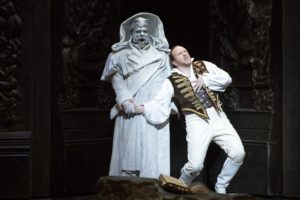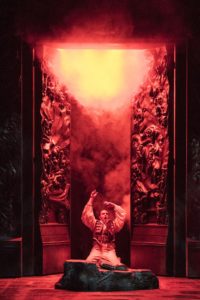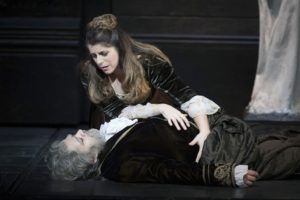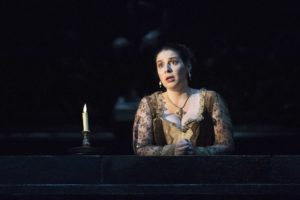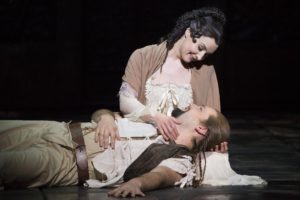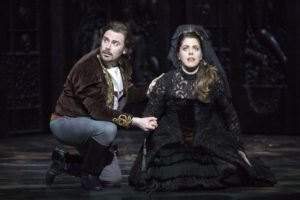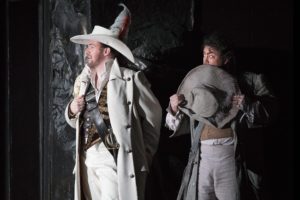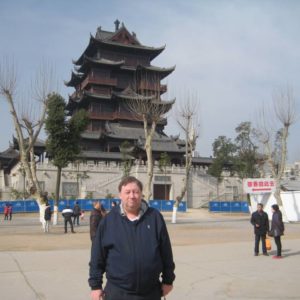 (4 / 5)
(4 / 5)
Music by Wolfgang Amadeus Mozart
Libretto by Lorenzo da Ponte
Mozart’s Don Giovanni performed by the magnificent Welsh National Opera tells the story of an arrogant sexual predator who uses his power and influence to entrap and overpower young ladies to succumb to his will. Sound familiar?
First performed in 1787 in Prague. it had to wait a further thirty years before receiving its UK premiere. Mozart has often been referred to, in his operatic work, with comparison to Shakespeare, in as much as he can move you from tears to laughter at the blink of an eye. Don Giovanni, is a black comedic version of the Spanish seventeenth play “El burlador de Sevilla y convidado de piedra” by Tirso de Molina, (1571-1641), which introduces the world to Don Juan, the legendary conqueror of over two thousand women.
Taking away all the trimmings, the story is a revenge tale, starting with a murder and ending with the protagonist getting his comeuppance. What accompanies the story are incidental occurrences to the main plot.
This WNO version, originally directed by John Caird, and revived under Caroline Chaney, has some rather incongruous sculptures reminiscent of Rodin, that seem to have little connection to the story. However, the sets are interesting and generally work well, The supernatural inclusion of ghostly figures is a success, but it is the lighting that, in particular, impressed me. Lighting designer David Hersey has created some beautiful and atmospheric scenes, especially at the play’s climax when a Doric gate is lit up in red depicting the protagonist’s descent into Hades in Dantean imagery, which is both is exciting and memorable.
The quality of the singing is uniformly excellent, without quite reaching the realms of brilliance.
American soprano Emily Birsan playing the part of Donna Anna, marking her first appearance outside of the US. She possesses a pleasing controlled voice and her rendition of the duet with her suitor Ottavio, “Fruggi, crudele fruggi”, (Cruel, why art thou near me?) is sung alternating between pathos when lamenting her dead father, and violence when expressing her need for revenge. Emily Birsan manages to maintain the dignity and elegance of Donna Anna throughout.
English soprano Elizabeth Watts, was the recipient of the Song Prize at the BBC Cardiff Singer of the Year in 2007. Having previously performed in the WNO’S production of The Marriage of Figaro, she plays Donna Elvira, a spurned ex-lover of Don Giovanni. Although abandoned by Don Giovanni and seeks revenge, she maintains a misdirected belief that she can change her ex-lover’s mind and win back his heart. Ms Watts has a cultivated clear soprano voice and her beautiful singing is illustrated in the aria, “A, fuggi il traditor”, (The traitor means deceit!), which is sung with great passion.
The third soprano, Zerlina is played by Devonian Katie Bray. Zerlina is a naive country girl betrothed to Masetto. Ms Bray manages not to make Zerlina too much of an innocent, and manages to project the darker side of her personality. Her duet with Don Giovanni, ” La ci darem la mano”, ( Give me thy hand, oh fairest), with the Don utilising his most seductive charms is one of the most memorable scenes in the entire opera.
Masetto, Zerlina’s bethrothed is regarded as a country bumpkin by Don Giovanni, and unworthy to be her husband. British baritone Gareth Brynmor John plays the character with gusto showing the right level of outrage and anger projected at his rival Don Giovanni.
Don Ottavio, “Benjamin Hulett), is Donna Anna’s betrothed. Hulet possess a pleasing tenor voice. His highlight is found in the aria, ” Il mio tesore intanto”, ( To my beloved, o hasten,) when Ottavio decides that it high time the police are informed about Don Giovanni’s antics.
Hungarian bass Miklos Sebastyen plays the Commendatore, Donna Anna’s murdered father. His strong voice add the required gravitas to the role.
David Stout plays Leporello, Don Giovanni’s much put upon servant with great comic ability as well as possessing a fine bass voice. His duets with Don Giovanni are a feature of any production. ” Eh! via buffone”, ( I’ll not believe thee), is particularly well done.
Irish baritone Gavan Ring in the title role, makes his debut with the WNO in this production. His acting skills come to the fore, rendering Don Giovanni as one of the great monsters in the world of opera, but without making him too unsympathetic to upset the balance of the story. He displays the Don’s arrogance and cruelty well, and manages to show heroism when accepting his fate. It is a very charismatic and energetic performance.
Conductor James Southall gets the best out of the musicians of the orchestra of the Welsh National Opera, although I felt that the overture was a little sluggish in places.
One minor quibble is in the climax, Don Giovanni after entering the gates to Hades is seen to be scampering off stage immediately afterwards. This detracts from one of the most electrifying climaxes in Opera, and is reminiscent of a similar complaint I made about the final scene of Tosca which I reviewed recently, also at the WNO. I would suggest that a greater attention to detail to rectify these distractions be paid in future.
I attended at the final performance of this production in Cardiff, but from the 7th March 2018, it tours England and ales. Futher details can be found at here
I cannot envisage a better scenario than to listen to the sublime music of Mozart backed by excellent singing and acting in a auditorium, to warm up the cockles of your heart on a cold winter’s day in Cardiff.
All photographs by Richard Hubert Smith
Roger Barrington

